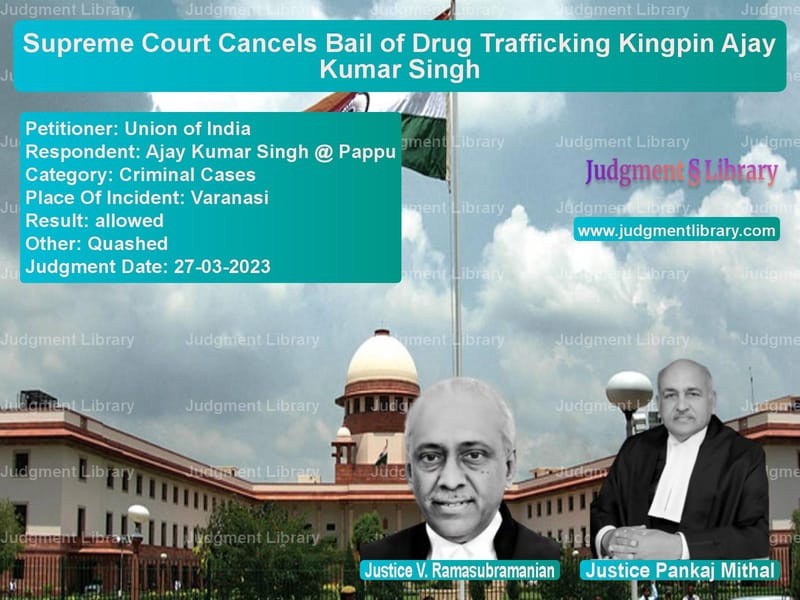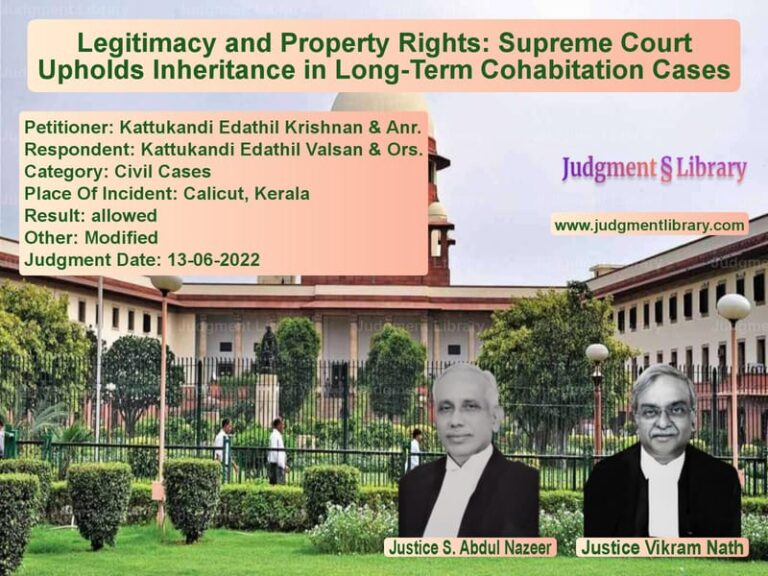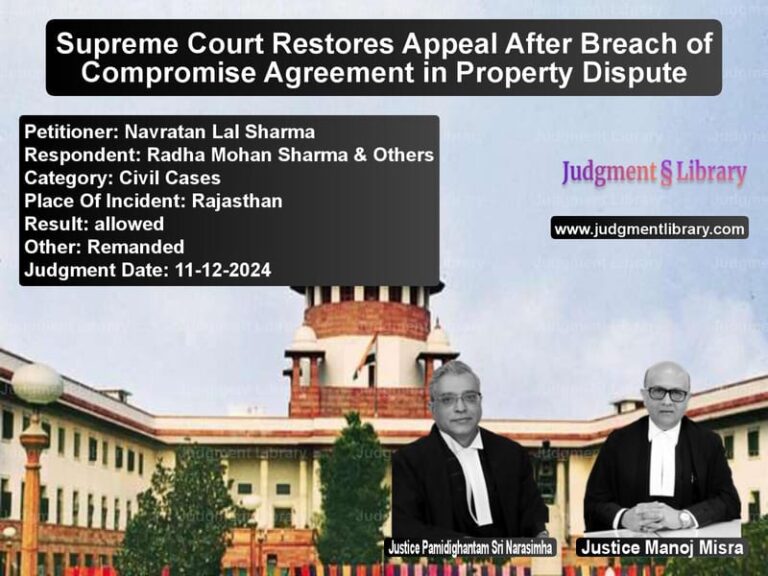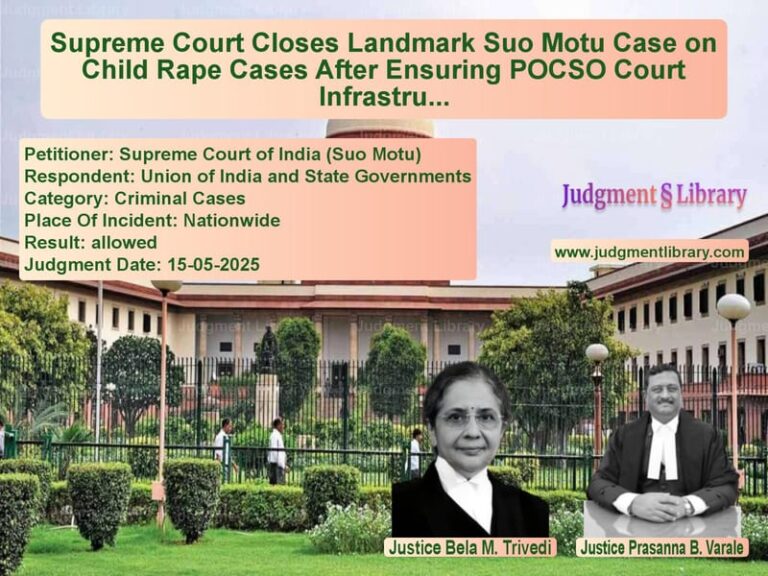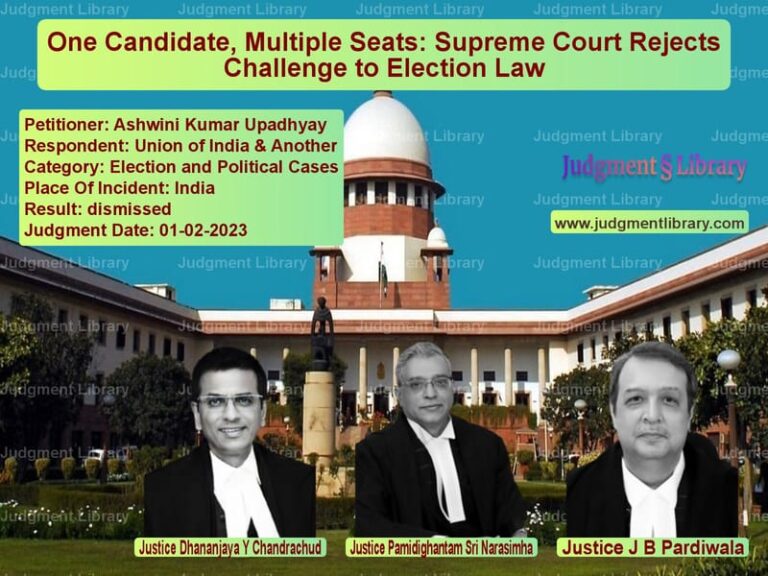Supreme Court Cancels Bail of Drug Trafficking Kingpin Ajay Kumar Singh
The Supreme Court of India has overturned the bail granted to Ajay Kumar Singh @ Pappu, an accused in a large-scale drug trafficking case under the Narcotic Drugs and Psychotropic Substances Act, 1985 (NDPS Act). The case, Union of India v. Ajay Kumar Singh, highlights the stringent requirements under Section 37 of the NDPS Act for granting bail in cases involving commercial quantities of narcotics.
Background of the Case
On January 11, 2021, the Directorate of Revenue Intelligence (DRI), Varanasi, received intelligence about a truck transporting a massive quantity of narcotics. The truck, bearing registration number AP-05-W-8699, was intercepted near Raja Talab while en route from Bhadrachalam (Andhra Pradesh) to Jaunpur (Uttar Pradesh). Upon search, the authorities discovered 3,971.6 kg of ganja hidden within plastic sacks.
The two individuals found in the truck—Om Prakash Yadav (driver) and Amit Yadav (helper)—were arrested and later granted bail. They disclosed that they were transporting the contraband on instructions from Ajay Kumar Singh, whom they identified as the mastermind behind the drug trafficking operation.
Read also: https://judgmentlibrary.com/supreme-court-acquits-murder-convict-pradeep-kumar-freed-after-19-years/
Petitioner’s Arguments (Union of India)
The Union of India, represented by Additional Solicitor General Aishwarya Bhati, argued:
- Ajay Kumar Singh was the primary orchestrator of the drug trafficking operation.
- He evaded arrest for over a year and was ultimately apprehended at a restaurant in Raipur.
- Section 37 of the NDPS Act prohibits bail for commercial drug trafficking cases unless the accused can prove prima facie innocence.
- The High Court of Allahabad erred in granting bail merely because the co-accused (driver and helper) were released.
- The accused has a history of involvement in multiple drug-related offenses, making him a repeat offender.
Respondent’s Arguments (Ajay Kumar Singh)
Ajay Kumar Singh’s defense counsel contended:
- The High Court granted bail based on Article 21 of the Constitution, ensuring the right to liberty.
- The co-accused had already been released, and Ajay Kumar Singh was similarly placed.
- The prosecution had not established direct possession of the drugs by the accused.
Supreme Court’s Judgment
The Supreme Court bench comprising V. Ramasubramanian and Pankaj Mithal overturned the bail order, ruling:
“The role of the respondent-accused is clearly different from that of the driver and the helper. He is the mastermind behind the illicit trade and a habitual offender. The High Court failed to apply Section 37 of the NDPS Act correctly.”
The Court highlighted the following errors in the High Court’s decision:
- The High Court did not assess whether the accused could satisfy the twin conditions under Section 37 of the NDPS Act.
- The co-accused were merely transporters, whereas Ajay Kumar Singh was the key supplier and financier.
- The accused’s prior criminal history indicated that he was likely to commit similar offenses if released.
Key Legal Takeaways
For NDPS Cases:
- The judgment reinforces that bail in NDPS cases involving commercial quantities is granted only under exceptional circumstances.
- Courts must strictly adhere to Section 37 of the NDPS Act before granting bail.
For Law Enforcement:
- The ruling emphasizes the importance of thoroughly investigating the roles of accused persons in organized drug trafficking networks.
- Authorities must ensure that repeat offenders do not exploit legal loopholes to secure bail.
For Legal Practitioners:
- The judgment serves as a precedent for challenging bail orders in drug-related cases.
- Defendants seeking bail must demonstrate that they are not guilty and will not reoffend.
Conclusion
The Supreme Court’s decision in Union of India v. Ajay Kumar Singh underscores the judiciary’s commitment to preventing drug trafficking. By setting aside the bail granted by the High Court, the Court has reinforced the legal barriers against granting bail to those involved in large-scale narcotics operations.
This ruling will serve as a benchmark for future NDPS cases, ensuring that accused individuals must meet stringent legal criteria before securing bail. The judgment also sends a strong message that those orchestrating drug trade operations will face the full force of the law.
Petitioner Name: Union of India.Respondent Name: Ajay Kumar Singh @ Pappu.Judgment By: Justice V. Ramasubramanian, Justice Pankaj Mithal.Place Of Incident: Varanasi.Judgment Date: 27-03-2023.
Don’t miss out on the full details! Download the complete judgment in PDF format below and gain valuable insights instantly!
Download Judgment: union-of-india-vs-ajay-kumar-singh-@-p-supreme-court-of-india-judgment-dated-27-03-2023.pdf
Directly Download Judgment: Directly download this Judgment
See all petitions in Drug Possession Cases
See all petitions in Bail and Anticipatory Bail
See all petitions in Judgment by V. Ramasubramanian
See all petitions in Judgment by Pankaj Mithal
See all petitions in allowed
See all petitions in Quashed
See all petitions in supreme court of India judgments March 2023
See all petitions in 2023 judgments
See all posts in Criminal Cases Category
See all allowed petitions in Criminal Cases Category
See all Dismissed petitions in Criminal Cases Category
See all partially allowed petitions in Criminal Cases Category

